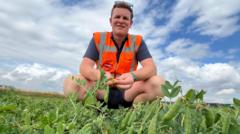Are Pea Shortages Looming Due to This Year's Early Harvest?

Concerns Over British Pea Shortages: The Impact of Extreme Weather
The agricultural landscape in the UK is currently facing significant challenges due to unprecedented weather patterns. Farmers are expressing deep concerns over a potential shortage of British-grown peas, primarily due to prolonged periods of sunshine and dry weather that led to the earliest harvest in 14 years. The National Farmers' Union (NFU) reports that vining pea growers across regions such as Lincolnshire, Norfolk, Suffolk, and East Yorkshire have experienced a staggering 30% drop in the number of peas picked and processed this year. This article delves into the implications of these climatic conditions on the pea supply chain, the farmers' perspectives, and potential solutions moving forward.
Understanding the Weather's Role in Agriculture
Weather plays a crucial role in agriculture, influencing crop yields, quality, and overall food supply. The recent climatic anomalies, including England's driest spring in over a century and record-high temperatures in June, have created an environment where traditional farming practices are struggling to adapt. The Met Office's reports indicate that some areas experienced three consecutive heatwaves during June and July, drawing moisture away from the soil and stressing crops. This situation has caused many farmers to voice their concerns regarding the sustainability of their harvests and the potential impact on consumers.
Insights from Farmers Facing the Crisis
Henry Moreton, a regional NFU chair in Lincolnshire, describes the current state of crops as “drying out and dying” due to the extreme heat and lack of moisture. He emphasizes that the east coast is a primary area for vining peas, known for its well-drained land optimal for pea growth. However, the situation has drastically changed, with farmers witnessing the earliest harvesting period they have experienced. Moreton is not alone in his sentiments; Ian Watson, an operations manager for Stemgold Peas, echoes these concerns, noting, “We’ve seen challenges right from the start of the season.”
The Implications of Early Harvesting
The early harvesting, which began on June 4 this year compared to the usual mid-June start, has raised alarm bells about crop yields. Watson reports that the drought has resulted in thinner crops, with the number of peas per pod dramatically decreasing. What used to yield up to ten peas per pod has now dwindled to as few as two. This significant drop in yield poses a serious threat to the availability of peas for both freezing and canning.
Challenges in the Supply Chain
The challenges extend beyond just the fields. Tom Screeton from Birds Eye highlights the logistical hurdles faced when adapting to the accelerated maturing of peas. With a critical two-and-a-half-hour window to process the freshly picked peas at the factory, the entire supply chain is under immense pressure. The usual processes of harvesting and transporting peas to the freezing facility in Hull have become increasingly complicated due to the rapid changes in crop maturity.
Quality Versus Quantity: The Taste of Sunshine
Interestingly, while the quantity of peas is in jeopardy, the quality appears to be exceptionally high this year. Michelle Lawrie, a quality manager at Birds Eye, notes that the sweetness of the peas is significantly influenced by the recent sunny weather. “This year in particular, we’ve had a lot of sun, so the peas are very, very sweet,” she states. This paradox of high-quality peas amidst a potential shortage presents both a challenge and an opportunity for producers.
Future Strategies for Sustainable Farming
As farmers and agricultural companies grapple with the ramifications of extreme weather, there is a growing recognition of the need for adaptation and resilience in farming practices. Screeton emphasizes the importance of developing more robust pea varieties that are drought-tolerant and stress-resistant as part of their breeding program. Such proactive measures are essential in ensuring the sustainability of pea production in the face of fluctuating weather patterns.
The Economic Impact of Pea Shortages
The potential shortage of British-grown peas is not just a concern for farmers; it has broader implications for consumers and the food industry. With peas being a staple in various dishes, a decline in availability could lead to increased prices and a shift in consumer behavior. Producers may need to consider alternative sourcing strategies or invest in imports to meet consumer demand, which could further impact prices and accessibility.
Mitigating Risks: The Role of Technology
As the agricultural sector continues to confront the challenges posed by climate change, technology may play a pivotal role in mitigating risks. Precision farming techniques, such as the use of drones for crop monitoring and soil sensors for moisture detection, can help farmers make informed decisions about irrigation and crop management. By leveraging technology, farmers can better adapt to changing weather conditions and optimize their yields.
Consumer Awareness and Support
Given the challenges facing pea farmers, it is crucial for consumers to be aware of the situation and support local agriculture. Purchasing frozen or canned British peas not only supports local farmers but also contributes to the sustainability of the agricultural sector. As consumers, making conscious choices can help ensure the continued availability of high-quality British produce, even in challenging times.
FAQs
What is causing the shortage of British-grown peas?
The shortage is primarily due to extreme weather conditions, including the driest spring in over a century and record-high temperatures, which have led to decreased yields and earlier harvests.
How does weather affect pea quality?
While adverse weather can decrease yield, it can also enhance the sweetness of the peas due to increased sunlight, resulting in higher quality produce despite lower quantities.
What measures are being taken to address the challenges faced by pea farmers?
Farmers are exploring the development of more robust, drought-tolerant pea varieties and leveraging technology to optimize farming practices and mitigate risks associated with extreme weather.
How can consumers support British pea farmers?
Consumers can support local farmers by purchasing British-grown frozen or canned peas, which helps sustain the agricultural sector and ensures the availability of high-quality produce.
In conclusion, the future of British-grown peas hangs in the balance as farmers face unprecedented challenges brought on by extreme weather. The situation calls for a collective effort from farmers, agricultural companies, and consumers to ensure the sustainability of this vital crop. As we navigate these changes, what role do you think innovation and consumer choices will play in shaping the future of agriculture? #BritishPeas #SustainableFarming #ClimateChange
Published: 2025-07-30 10:00:35 | Category: technology



